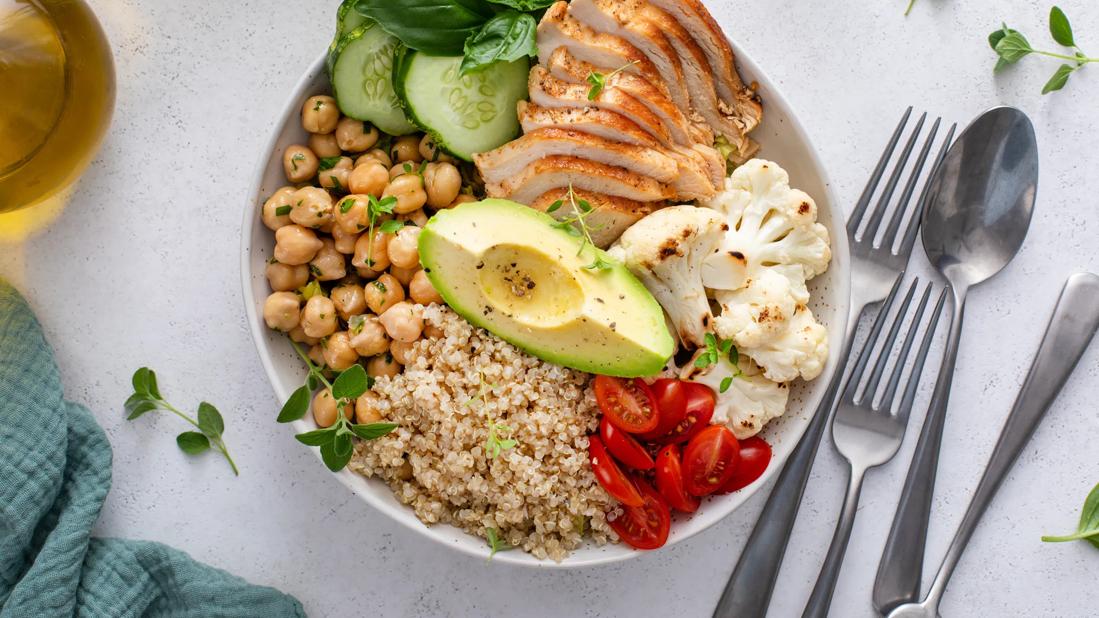Eating whole grains, salmon, fruits and vegetables can help you achieve longer, healthier locks

Image content: This image is available to view online.
View image online (https://assets.clevelandclinic.org/transform/d26743ee-ec8c-4a5f-9d34-4ccfc17ed282/protein-bowl-1978756211)
Lean protein bowl with grains, chicken, chickpeas, cucumber, cauliflower, avocado and tomatoes
Luscious locks may start with what’s on your plate. Many factors affect the health of your hair and how fast it grows. While you can’t change your genes, age or certain health conditions, there’s one factor you can control: what you eat.
Advertisement
Cleveland Clinic is a non-profit academic medical center. Advertising on our site helps support our mission. We do not endorse non-Cleveland Clinic products or services. Policy
“Good nutrition plays a huge role in helping hair grow and minimizing hair loss,” says registered dietitian Michelle Dodd, RD, LD. “You need the proper balance of essential nutrients for hair to be healthy.”
“Your food choices affect anything growing on or in your body,” says Dodd.
Brittle, straw-like hair and hair loss can be signs of an unhealthy diet that’s lacking in nutrients.
“Hair follicles in your scalp help hair grow,” she explains. “Chemicals, overheating, trauma and poor nutrition can damage these follicles, stunting hair growth and causing hair to fall out.”
Fortunately, you can help protect your locks and stimulate hair growth by choosing the right foods.
“The foods promoted in the Mediterranean diet are among the best for hair health,” shares Dodd.
This eating plan focuses on plant-based foods, whole grains, lean meats and healthy fats. Dodd shares the eight best foods for hair growth.
Lean meats, like chicken and fish, provide protein and iron. Protein is essential for every structure in your body, including hair. In fact, your hair (as well as your skin and nails) is made from a protein called keratin.
“Iron carries oxygen to all cells in your body, which is how hair grows,” explains Dodd. “Low iron (anemia) can cause hair to shed faster than it grows.”
Advertisement
In addition to lean meats, you can get protein from plant sources, including:
Salmon, herring, mackerel and other fatty fish are high in omega-3 fatty acids. These healthy fats have anti-inflammatory properties that minimize oxidative stress.
“Oxidative stress occurs when molecules called free radicals damage cells in your body,” says Dodd. “This damage can affect any part of your body, including hair follicles.”
Other good sources of omega-3s include:
Egg yolks (but not the whites) are high in biotin. This B vitamin helps make keratin. While one study shows a connection between low biotin levels and hair loss, other studies have yet to prove that getting more biotin means growing more hair.
Still, biotin is essential for making amino acids.
“These molecules are the building blocks of keratin and other proteins,” notes Dodd.
Whole grains have selenium, an essential mineral that keeps your thyroid gland healthy.
“Thyroid disease can cause your hair to stop growing, become brittle or fall out,” says Dodd.
But even people who don’t have thyroid issues need selenium to regulate thyroid hormones and promote hair growth.
Leafy greens, such as spinach, kale and leaf lettuce, have vitamin A.
“This fat-soluble vitamin helps make sebum, the oily substance that moisturizes your scalp and keeps hair healthy,” shares Dodd. “A vitamin A deficiency can cause a dry, scaly scalp and poor hair growth.”
“This water-soluble vitamin acts as an antioxidant to minimize inflammation that affects hair growth and leads to hair loss,” says Dodd.
Your body also needs vitamin C to make collagen. This protein strengthens your hair, so it’s less likely to become straw-like and break.
Foods high in vitamin C include:
Shellfish, such as clams, oysters, crab and shrimp, are good sources of zinc.
“You need zinc to make keratin and grow hair,” says Dodd.
Don’t forget to hydrate while enjoying these foods.
“Dehydration dries out your scalp, slowing hair growth,” warns Dodd.
She suggests drinking at least 64 ounces (2 liters) of water a day unless you have a health condition and need to drink less. You should drink more if you’re sweating a lot or live in a hot climate.
Advertisement
While some vitamins and supplements may support hair growth, Dodd says your body absorbs nutrients better from foods.
“Because some supplements and medications interact, always talk to your healthcare provider before taking a supplement,” she advises.
Advertisement

Sign up for our Health Essentials emails for expert guidance on nutrition, fitness, sleep, skin care and more.
Learn more about our editorial process.
Advertisement
Rosemary oil’s antioxidant, anti-inflammatory and antimicrobial properties could help stimulate hair growth
Scalp cancers can occur because of long-term sun exposure
Soften your skin with warm water and shaving cream before shaving with the grain of the hair
Age is the most likely reason for typical graying, but premature graying may be caused by stress, diet, smoking or autoimmune disease
Focus on nutrition, gentle styling habits and adapting to your hair type
How often you lather up your locks can depend on various factors, like hair type, age and ethnicity
Your genes, ethnicity, diet and stress levels may all affect your facial hair
Your hair removal routine will depend on your pain tolerance, budget and skin sensitivities
Although it could be used as a moisturizer, this new trend is not recommended
Communicating clear limits helps protect your time, energy and emotional well-being
High cholesterol can be genetic, but testing and treatment can lower your heart disease risk